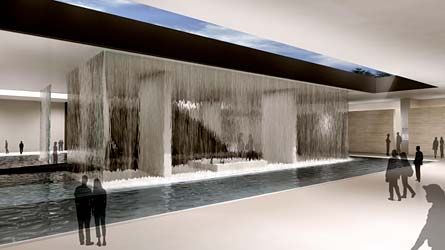| Lower
Waters
By Bradley Campbell and Matthias Neumann

Click these thumbnails for enlarged views of the Lower
Waters proposal.
• • • • • • • • • • • • • • •
In this design, an inclined park covers the memorial
site. On the site of the North Tower, a pool of water sits
on top of a granite memorial building. In this building,
the names of the victims and a private area for their families
are located below ground level, surrounded by thick walls.
Where the South Tower stood, there is a
lowered plaza with benches and trees. Also in this plaza is the glass
façade
of the Museum of September 11.
Bradley Campbell is a working artist living
in Brooklyn. Matthias Neumann, who also lives in Brooklyn,
was born in Germany and grained as an architect in Germany,
Canada, and Italy.
• • • • • • • • • • • • • • •
Finalist Statement
Water and light symbolize life, rejuvenation and rebirth. By using water
and light as key elements of the design and by bringing people
directly to the site of the attacks, we hope that visitors
will remember not only
the loss of life but also the sanctity of life that we live
each day. These elements point to the passing of time, and
speak to us of emotion
and transcendence. The site is designed to provide a place
in this city and within each of us where we may find peace
in experiencing the challenging,
often painful cycle of death, grief, rebirth and life.
Our
physical movement throughout the site, the inclined park
and the various levels of memorial and museum, represents
our emotional movement through the experiences of memory,
grief, discovery, hope, and rebirth. We descend to the memorial
spaces, the
literal and
figurative
centers, and to the Museum of September 11. Our contact with
the names of the victims, their final resting place, the
original slurry wall,
and bedrock level of the World Trade Center causes us to
contemplate the profound loss suffered on September 11 and
to be grateful for the
many that were saved. As we ascend, we come back to the city
and ourselves transformed by the emotional and historic magnitude
of that day.
Materials have been carefully chosen to support
the concept, symbolism and emotion of the memorial. The memorial
space of the North Tower is clad in black granite - solemn,
strong, stable
- a reference
to living memory and to the foundation of the towers. The
private area for families of the victims and the intimate
area for the public are
made of thick walls of earth, to suggest comfort and stability
at the depths. The façade of the Museum of September 11 in the
South Tower Footprint is stacked glass with sanded edges
referring to both
the construction and collapse of the towers.
The design meets
the daunting challenge of unifying the various site characteristics,
the breadth of emotional and historical
significance, and the community's many requirements. It
is important that the site
fulfill two major roles in the complex program of this
memorial. First, it is a place of peace, reflection and reverence where
we engage ourselves
emotionally and spiritually. Second, it addresses the need
for an intellectual understanding and historical perspective
of the events of September 11,
2001. These are the dual roles of, and the overlap between,
the Memorial and the Museum of September 11, 2001.
Back to the main page
|